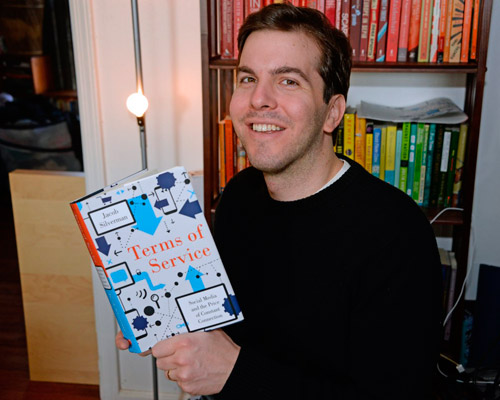Put down that selfie stick!
A Park Slope author has written a new book outlining what he sees as the potential perils of our collective addiction to social media. In “Terms of Service: Social Media and the Price of Constant Connection,” Jacob Silverman, who also works as a book reviewer and was a three-day “Jeopardy!” champion, explores the real world costs of our virtual lives, such as embarrassing online photos leaks and dwindling privacy. We caught up with Silerman ahead of his book launch at PowerHouse Arena in Dumbo on March 17.
Vanessa Ogle: How do you think documenting our lives on social media affects the way we experience the world?
Jacob Silverman: One thing I write about is — and this is in an excerpt of my book that was published recently — is something called the “Facebook eye,” which is this notion that we kind of start looking at the world in ways that it can be made sharable. I think that is a genuine phenomenon that we have become so habituated to documenting our own lives and then to sharing them that we now sometimes look at the world with one eye or part of our mind attuned towards, you know, ‘How can this be shared? Where would I put this on Facebook or Instagram or wherever?’
VO: Are you concerned about the lack of privacy now that everyone is a public figure?
JS: A lot of us are sort of forced to act like public figures without really reaping many of the benefits. It is kind of part of how the culture has developed. We know anything we say could suddenly go viral or get attention — often for the wrong reason. That is a very real fear that a lot of people have. There are a fair number of people out there who feel that they have to conduct themselves with sort of the put together, PR-approved posture of a public figure even if they may not be famous in any conventional way.
VO: Do you think future generations are going to move away from social media, or do you think it is bound to get more intense?
JS: I don’t know. I think there are a couple angles to that. The one thing I see that a lot of young people are going to messaging apps and sort of more private online social spaces. People are interacting by locking down their profile or switching to things like Snapchat or WhatsApp for more freedom to experiment or explore.
We often hear that people’s notions for privacy are changing — well, I think that is true for some people, certainly more privileged folks who can afford to be very open about their lives online and not really have to worry about the consequences. But you still see in the other direction there are ways in which reputation is being made into a commodity. At its very worst, it’s being weaponized, whether it is revenge porn or mugshot galleries online — all these ways in which reputation is being used to kind of embarrass or shame people. Those kinds of things are very tied into the cost of living in public and of everyone sort of being a public figure.
Even as people seem to be more accommodating of others on social media, I still worry about these ways in which shaming and the value of an online reputation and one Google search result have become even more prominent in ways that I don’t necessarily think are for the better.
VO: You have a pretty sizable Twitter following. Do you ever feel a conflict between your personal views on social media and things that you maybe have to do to stay relevant in your field?
JS: Yeah. Well, I should point out, some of my Twitter followers are fake. There’s a short portion in my book about this. I bought like 2,500 fake Twitter followers to see how that process works. I don’t know, it is weird — it is still something I’m trying to get a handle on. Like, when I’m writing online or even just on Twitter, I feel like I do have an audience but I really don’t know who these people are, how many people are actually logged in and watching at that moment. It still feels very abstract. It’s not necessarily like the worst thing in the world. It’s nice to have people who are potentially interested in your stuff. I do think the sort of downside is if you’re a writer of any sort today it does feel kind of essential to have this public profile, to be present on all these social platforms. I would like to spend a lot less time doing all that type of stuff and just more time working and writing.
Jacob Silverman launches “Terms of Service” at PowerHouse Arena [37 Main St. between Water and Front streets in Dumbo, (718) 666–3049, www.power
























